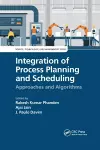
Integration of Process Planning and Scheduling
3 contributors - Paperback
£47.99
Rakesh Kumar Phanden completed his graduation in Mechanical Engineering from the U.P. Technical University, Lucknow, India and post-graduation in Integrated Product Design and Manufacturing from the Department of Mechanical Engineering, G.J.U. of Science and Technology, Hisar, India. He completed his PhD in Mechanical Engineering from the National Institute of Technology, Kurukshetra, India in 2013. He is currently working in the Department of Mechanical Engineering at the Amity University, Uttar Pradesh, India. He has twelve years of teaching experience at private and government institutes and universities. He has contributed more than 30 papers at the national/international levels. His current areas of interest include manufacturing systems, production scheduling, integration of process planning and scheduling and product design and manufacturing.
Ajai Jain is Ph.D. from Kurukshetra University, India in 2003. His Master of Engineering is from the Department of Production & Industrial Systems Engineering within the University of Roorkee, India in 1993. Dr. Jain has secured masters and bachelor with honors. He is working as a professor in the Mechanical Engineering Eepartment of National Institute of Technology Kurukshetra, India. He is having 25 years of working experience in teaching undergraduate and postgraduate courses of mechanical engineering. He is Fellow member of Institution of Engineers (India) and Life Member of ISTE. He has worked as a Principal Investigator in a project on Integration of Process Planning and Scheduling sponsored by the Science and Engineering Research Council, Department of Science and Technology, New Delhi, Govt. of India. He has delivered many invited lectures in short term courses. Dr. Jain has supervised 7+ Ph.D. candidates. His research area includes design and operation of manufacturing systems, process planning, production scheduling, integration of process planning and scheduling. reconfigurable manufacturing systems, advanced machining process, WEDM, computer-aided manufacturing, computer integrated manufacturing. He has published many research articles in the journals of international repute. His SCOPUS h-index is 13+.
J. Paulo Davim received his Ph.D. degree in Mechanical Engineering in 1997, M.Sc. degree in Mechanical Engineering (materials and manufacturing processes) in 1991, Mechanical Engineering degree (5 years) in 1986, from the University of Porto (FEUP), the Aggregate title (Full Habilitation) from the University of Coimbra in 2005 and the D.Sc. from London Metropolitan University in 2013. He is Senior Chartered Engineer by the Portuguese Institution of Engineers with an MBA and Specialist title in Engineering and Industrial Management. He is also Eur Ing by FEANI-Brussels and Fellow (FIET) by IET-London. Currently, he is Professor at the Department of Mechanical Engineering of the University of Aveiro, Portugal. He has more than 30 years of teaching and research experience in Manufacturing, Materials, Mechanical and Industrial Engineering, with special emphasis in Machining & Tribology. He has also interest in Management, Engineering Education and Higher Education for Sustainability. He has guided large numbers of postdoc, Ph.D. and master’s students as well as has coordinated and participated in several financed research projects. He has received several scientific awards. He has worked as evaluator of projects for ERC-European Research Council and other international research agencies as well as examiner of Ph.D. thesis for many universities in different countries. He is the Editor in Chief of several international journals, Guest Editor of journals, books Editor, book Series Editor and Scientific Advisory for many international journals and conferences. Presently, he is an Editorial Board member of 30 international journals and acts as reviewer for more than 100 prestigious Web of Science journals. In addition, he has also published as editor (and co-editor) more than 100 books and as author (and co-author) more than 10 books, 80 book chapters and 400 articles in journals and conferences (more than 250 articles in journals indexed in Web of Science core collection/h-index 50+/7500+ citations, SCOPUS/h-index 56+/10500+ citations, Google Scholar/h-index 71+/16500+).